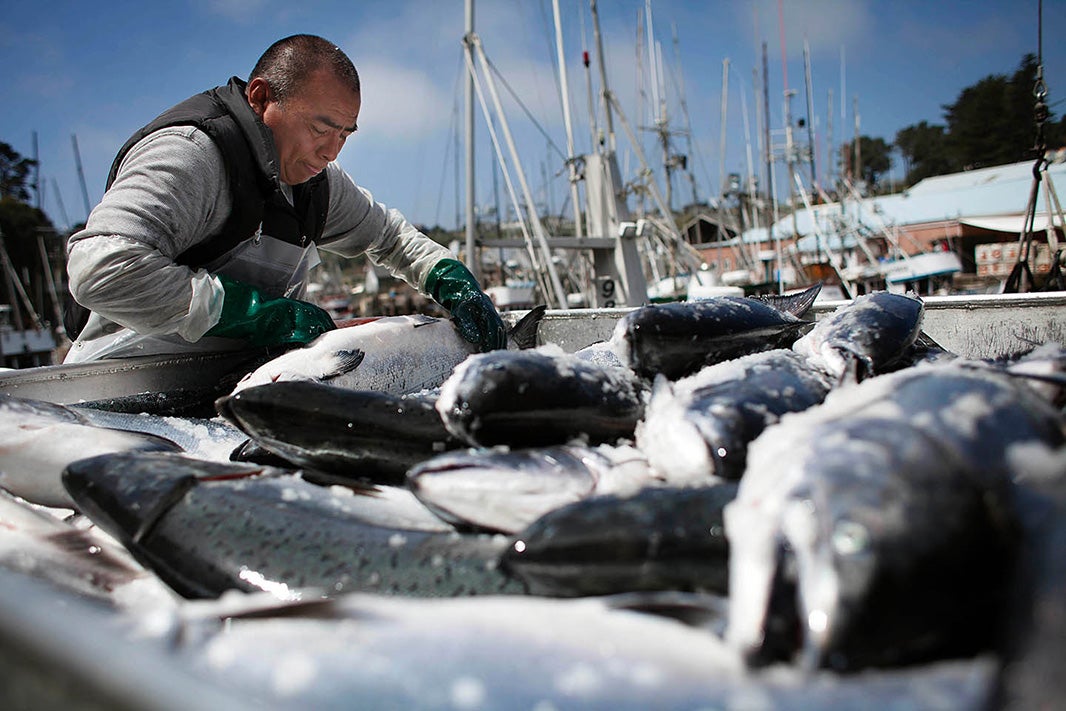Judge Rejects Agribusiness’ Water-Grabbing Lawsuit over Trinity River Flows
Victory
—Court largely upholds government’s authority to protect to endangered salmon and coastal fishing communities, and meet tribal treaties
Contact
A federal judge dismissed almost all claims in a lawsuit brought by a coalition of agribusiness and irrigators seeking to prevent the protection of salmon in California’s Trinity River. Judge Lawrence O’Neill, based on Fresno, California, largely upheld the Bureau of Reclamation’s ability to provide additional flow in the Trinity to prevent harm to salmon, but indicated that different legal authorities need to be invoked.
The agribusiness-dominated San Luis & Delta-Mendota Water Authority and Westlands Water District brought the case last year against the Bureau of Reclamation, which controls water releases from the Trinity Reservoir to the drought-stricken Trinity and Lower Klamath rivers in Oregon. These rivers support huge runs of Chinook and coho salmon, on which commercial fishing industries and the Yurok and Hoopa Valley Tribes depend for sustenance. This area has been the heartland of these tribes for thousands of years. The water districts brought the case after the Bureau proposed in 2013 to increase flow levels in the Trinity to avoid another massive fish kill in the Lower Klamath.
The Pacific Federation of Fishermen's Associations, represented by Earthjustice, and the Hoopa and Yurok Tribes, intervened in defense of the Bureau of Reclamation to protect salmon and the local fishing industry. After an evidentiary hearing in August 2013, Judge O’Neill rejected the irrigators’ request to block the flow program. Judge O’Neill rejected a similar request with respect to the 2014 program. Today’s ruling represents the final resolution of the legal issues in this case.
"Ultimately this case is also about preserving the California salmon fishing industry,” said Glen Spain, NW Regional Director of the Pacific Coast Federation of Fishermen's Associations (PCFFA), which represents commercial fishing families coastwide. “It makes no sense to sacrifice thousands of fisheries jobs over 700 miles of coastline to provide just a little bit more water to a voracious California Central Valley Agribusiness system that has already sucked up far more than its share in a major drought."
This ruling will affect the salmon populations, coastal fishing communities and tribes who rely on salmon. During drought, the Bureau’s water releases from the Trinity River to the Lower Klamath are critical to the survival of salmon as thousands of them return to the river to spawn in late summer. In 2002, the Bush Administration’s water management policies in the basin led to a fish kill of more than 70,000 salmon in the Lower Klamath, one of the worst in U.S. history. The die-off resulted in coast-wide closures of commercial, recreational and tribal fishing which dealt a huge blow to the local economy resulting in $200 million in losses.
"Straight up, if the Bureau of Reclamation did not make the decision to augment flows on the Klamath, we would be right now cleaning up thousands of salmon carcasses on the river,” said Thomas P. O'Rourke, Sr., Chairman of the Yurok Tribe. “We applaud Judge O'Neill's decision. We need to do everything possible to ensure in-basin fish needs are met and to prevent another heartbreaking tragedy on the Klamath River."
“Any second-grader can tell you that fish need water,” said Jan Hasselman, Earthjustice attorney based in Seattle. “The court largely affirmed the government’s ability to manage water in the basin to protect fish and the people who rely on them. We will continue to work to ensure that good science is the touchstone of water management in the Trinity basin.”
The court rejected a wide number of claims brought by the irrigators in the case. The Court did find for the irrigators that the 1955 statute that the government relied on as authority for supplemental flows did not actually provide such authority. The Bureau will need to invoke different legal authority if additional releases are required in the future.
BACKGROUND
In 2013, there were extremely low flow conditions in the Lower Klamath occurring at the same time fisheries managers expected the second-largest run of Chinook salmon on record. Federal, state and tribal salmon biologists were concerned that the confluence of high runs and low flows would lead to another disaster like the ‘Fish Kill of 2002.’
To avoid the projected die-off, the Bureau of Reclamation developed a plan to release extra water from dams along the Trinity River (a tributary of the Klamath) to improve the Klamath’s water conditions. In response, San Luis & Delta-Mendota Water Authority and Westlands Water District, serving the interest of powerful agribusiness, filed a lawsuit in an attempt to declare unlawful the Bureau’s authority to release water from the Trinity River.

Additional Resources
About Earthjustice
Earthjustice is the premier nonprofit environmental law organization. We wield the power of law and the strength of partnership to protect people's health, to preserve magnificent places and wildlife, to advance clean energy, and to combat climate change. We are here because the earth needs a good lawyer.